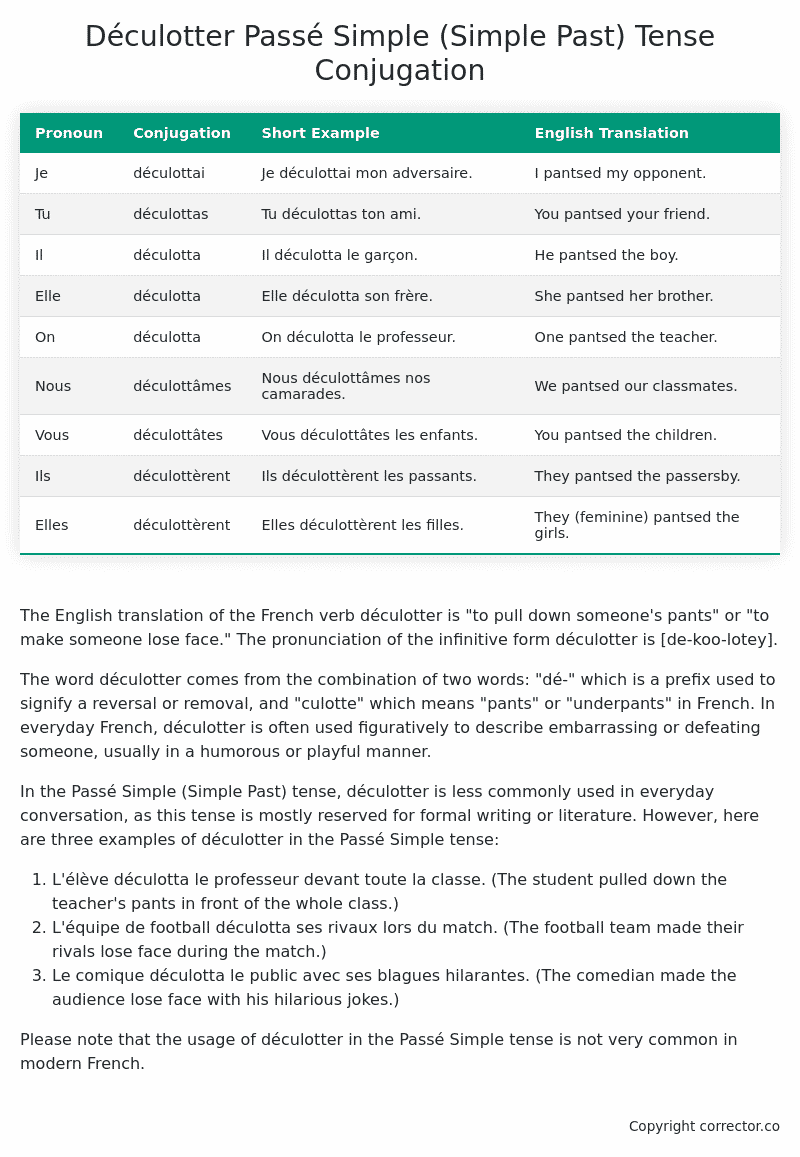Passé Simple (Simple Past) Tense Conjugation of the French Verb déculotter
Introduction to the verb déculotter
The English translation of the French verb déculotter is “to pull down someone’s pants” or “to make someone lose face.” The pronunciation of the infinitive form déculotter is [de-koo-lotey].
The word déculotter comes from the combination of two words: “dé-” which is a prefix used to signify a reversal or removal, and “culotte” which means “pants” or “underpants” in French. In everyday French, déculotter is often used figuratively to describe embarrassing or defeating someone, usually in a humorous or playful manner.
In the Passé Simple (Simple Past) tense, déculotter is less commonly used in everyday conversation, as this tense is mostly reserved for formal writing or literature. However, here are three examples of déculotter in the Passé Simple tense:
- L’élève déculotta le professeur devant toute la classe. (The student pulled down the teacher’s pants in front of the whole class.)
- L’équipe de football déculotta ses rivaux lors du match. (The football team made their rivals lose face during the match.)
- Le comique déculotta le public avec ses blagues hilarantes. (The comedian made the audience lose face with his hilarious jokes.)
Please note that the usage of déculotter in the Passé Simple tense is not very common in modern French.
Table of the Passé Simple (Simple Past) Tense Conjugation of déculotter
| Pronoun | Conjugation | Short Example | English Translation |
|---|---|---|---|
| Je | déculottai | Je déculottai mon adversaire. | I pantsed my opponent. |
| Tu | déculottas | Tu déculottas ton ami. | You pantsed your friend. |
| Il | déculotta | Il déculotta le garçon. | He pantsed the boy. |
| Elle | déculotta | Elle déculotta son frère. | She pantsed her brother. |
| On | déculotta | On déculotta le professeur. | One pantsed the teacher. |
| Nous | déculottâmes | Nous déculottâmes nos camarades. | We pantsed our classmates. |
| Vous | déculottâtes | Vous déculottâtes les enfants. | You pantsed the children. |
| Ils | déculottèrent | Ils déculottèrent les passants. | They pantsed the passersby. |
| Elles | déculottèrent | Elles déculottèrent les filles. | They (feminine) pantsed the girls. |
Other Conjugations for Déculotter.
Le Present (Present Tense) Conjugation of the French Verb déculotter
Imparfait (Imperfect) Tense Conjugation of the French Verb déculotter
Passé Simple (Simple Past) Tense Conjugation of the French Verb déculotter (You’re reading it right now!)
Passé Composé (Present Perfect) Tense Conjugation of the French Verb déculotter
Futur Simple (Simple Future) Tense Conjugation of the French Verb déculotter
Futur Proche (Near Future) Tense Conjugation of the French Verb déculotter
Plus-que-parfait (Pluperfect) Tense Conjugation of the French Verb déculotter
Passé Antérieur (Past Anterior) Tense Conjugation of the French Verb déculotter
Futur Antérieur (Future Anterior) Tense Conjugation of the French Verb déculotter
Subjonctif Présent (Subjunctive Present) Tense Conjugation of the French Verb déculotter
Subjonctif Passé (Subjunctive Past) Tense Conjugation of the French Verb déculotter
Subjonctif Imparfait (Subjunctive Imperfect) Tense Conjugation of the French Verb déculotter
Subjonctif Plus-que-parfait (Subjunctive Pluperfect) Tense Conjugation of the French Verb déculotter
Conditionnel Présent (Conditional Present) Tense Conjugation of the French Verb déculotter
Conditionnel Passé (Conditional Past) Tense Conjugation of the French Verb déculotter
Conditionnel Passé II (Conditional Past II) Tense Conjugation of the French Verb déculotter
L’impératif Présent (Imperative Present) Tense Conjugation of the French Verb déculotter
L’impératif Passé (Imperative Past) Tense Conjugation of the French Verb déculotter
L’infinitif Présent (Infinitive Present) Tense Conjugation of the French Verb déculotter
L’infinitif Passé (Infinitive Past) Tense Conjugation of the French Verb déculotter
Le Participe Présent (Present Participle) Tense Conjugation of the French Verb déculotter
Le Participe Passé (Past Participle) Tense Conjugation of the French Verb déculotter
Struggling with French verbs or the language in general? Why not use our free French Grammar Checker – no registration required!
Get a FREE Download Study Sheet of this Conjugation 🔥
Simply right click the image below, click “save image” and get your free reference for the déculotter Passé Simple tense conjugation!

Déculotter – About the French Passé Simple (Simple Past) Tense
Formation
Usage
Narration
Historical Context
Interactions with other tenses
Passé Composé
Imparfait
Conditional and Subjunctive
Summary
I hope you enjoyed this article on the verb déculotter. Still in a learning mood? Check out another TOTALLY random French verb conjugation!


